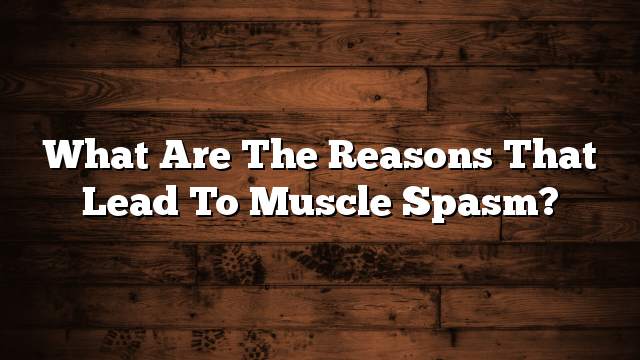Muscle spasm
Muscle spasm is defined as a condition in which an involuntary contraction of a part of the muscle, or the whole muscle, or more of a muscle, lasts for a few seconds and sometimes reaches for a quarter of an hour, causing severe pain or weakness in the ability to move the injured muscle, Such as the muscle of the foot and leg, or involuntary muscle movement such as the intestine, uterus, and airway, and it must be noted that everyone is vulnerable to injury convulsions, and the result of several reasons we will know you in this article.
What causes muscle spasm
Negative exercises that cause muscle spasms
- Exposure to a particular injury, as the spasm may be a preventive mechanism after the injury, such as bone fracture and orthosis, due to lack of movement of the affected member.
- Strong use of the muscle, such as the sudden exercise of violent and cruel sports, or unusual activity, although these convulsions may occur during or shortly after the activity.
- Muscle is prone to fatigue from lying down or sitting on it for long periods.
- Resting the muscle for a long time, often during the night, and it is painful, and affects the continuity of sleep, and disrupts it.
- Drought due to the loss of a large amount of fluids due to sweating and depletion of large amounts of body fluids, the result of vigorous activities and exercises, it must be noted that these convulsions occur after continuous exposure to the sun and sunburn.
Health problems causing muscle cramps
- Lack of calcium and magnesium levels in the blood. This is common in pregnant women who do not take supplements of these minerals during pregnancy, because of a lack of intake of calcium and magnesium rich foods, because of excessive vomiting, or in the body’s inability to absorb calcium Lack of Vitamin D
- Some drugs, such as Alzheimer’s, osteoporosis in postmenopausal women, high blood pressure medications, angina pectoris, cholesterol lowering drugs, or diuretics, may cause a decrease in the amount of Calcium, potassium, and magnesium in the body, leading to cramps.
- Addiction to one of the drugs during the period of withdrawal to get rid of addiction, such as sedatives, alcohol, painkillers, anti-anxiety drugs.
- Lack of vitamin levels in the body, such as vitamin B1 deficiency, B5, B6.
- Poor blood circulation in the body, especially in the legs, where muscle tissue suffers from a lack of oxygen intake, causing severe pain, as a result of the accumulation of lactic acid in muscle tissue.
- Excessive nerve excitability, the most common cause of muscle spasm, especially skeletal muscle.
